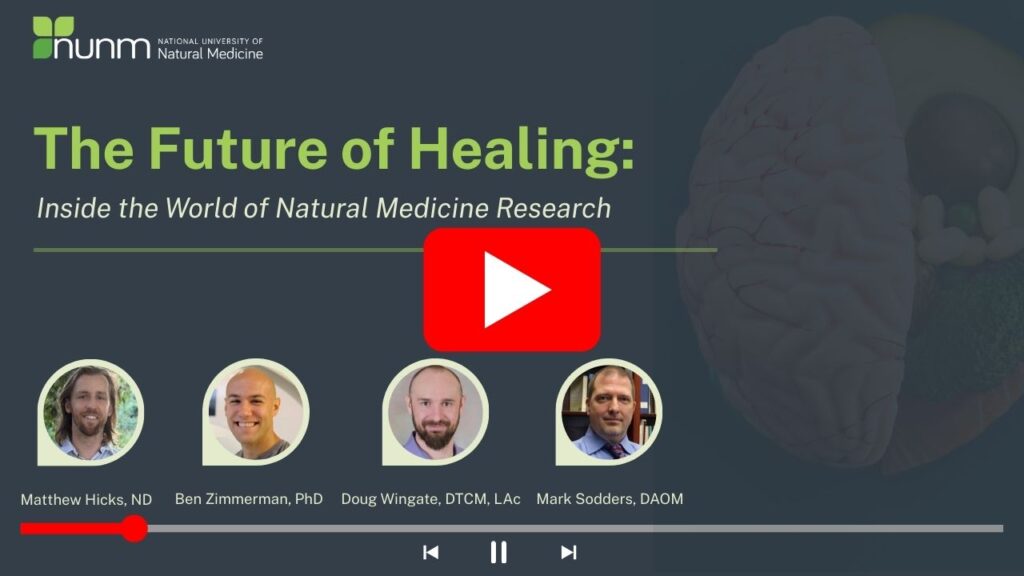NUNM researchers explore integrative health and cognitive resilience across the lifespan

Could the story we know about brain health and aging be just one piece of a larger puzzle?
With cognitive disorders and mental health conditions expected to rise in the coming years, according to research published through the National Institutes of Health (1,2), conventional medicine alone may not be sufficient to provide the answers that can fully address patient needs.
Experts from the Helfgott Research Institute at the National University of Natural Medicine (NUNM), came together with other leaders in integrative healthcare to explore new possibilities and possible solutions.
In an NUNM webinar, “The Future of Healing: Inside the World of Natural Medicine Research,” they offer new insights on everything from psilocybin therapy and acupuncture to aging and trauma recovery.
Together, their presentations are redefining what it means to heal, grow old, recover fully, and thrive across a lifetime.
The webinar featured four experts in brain health:
- Matthew Hicks, ND: “Psychedelics and the Brain”
- Ben Zimmerman, PhD: “Aging and Cognitive Health”
- Doug Wingate, DTCM, LAc: “Rewiring the Injured Brain: New Frontiers in Neurofeedback & TBI Recovery”
- Mark Sodders, DAOM: “Acupuncture and Brain Trauma Recovery”
Their work demonstrates how the brain is more resilient than once believed. Psychedelic therapies show promise for enhancing neuroplasticity, while other studies suggest cognitive decline isn’t inevitable—brain function may be preserved, or even improved over time.
Complementary techniques like acupuncture and neurofeedback further highlight the brain’s natural tendency to be dynamic and adaptive in the face of serious challenges.
Psychedelics & the Brain
Dr. Matthew Hicks, a naturopathic physician, researcher, and licensed psilocybin facilitator, explores the transformative potential of psychedelics. He discusses its capacity to enhance neuroplasticity and neural connections, as well as the need for legal reforms in psychedelic therapy and equitable access for patients seeking alternative mental health treatments.
Key Takeaways:
- Neuroplasticity & Brain Chemistry: Psilocybin boosts a protein known as brain-derived neurotrophic factor (BDNF), which lowers brain activity and helps individuals form new neural connections—helping them avoid negative thought patterns.
- Group Therapy for Accessibility: Dr. Hicks tested group psilocybin therapy with low-income adults facing depression and found it could reduce symptoms.
- Legal & Equity Challenges: While the Oregon Psilocybin Services model is a first in the United States, high costs and federal rules limit access, reinforcing the need for ongoing evidence-based research.
Aging & Cognitive Function
Dr. Ben Zimmerman, a neuroscientist and researcher at Helfgott Research Institute, debunks the myth that cognitive decline in aging is predetermined. He emphasizes early prevention and shares research on herbal medicine for brain health.
Key Takeaways:
- Cognitive Resilience in Aging: Long-term studies show many older adults sustain or even improve cognitive abilities. Skills like vocabulary, which are part of “crystallized intelligence”, often remain strong over time.
- Timing Is Everything: Alzheimer’s drug trials often fail because they start too late, after significant brain damage has already occurred, making early prevention essential.
- Botanical Innovation: Studies on herbs like Gotu Kola, or Centella asiatica, show promise to support vascular health and cognition, reinforcing patients’ ability to take simple steps to improve long-term brain health.
Rewiring the Injured Brain
Dr. Doug Wingate, a functional medicine clinician and neurotherapist, explores brain regeneration after traumatic brain injury (TBI). He challenges conventional ideas of “recovery limits” and explores how advanced neurofeedback can complement psychedelic therapy.
Key Takeaways:
- Limitations of TBI Care: Traditional treatments often leave patients plateaued. Dr. Wingate uses health modalities such as acupuncture, light therapy, and oxygen treatment to promote continued brain regeneration beyond mere recovery.
- Innovations in Neurofeedback: Passive brainwave monitoring offers a promising drug-free way to rewire neural pathways for trauma patients.
- Future Research & Synergies: Combining neurofeedback with psychedelic therapy shows promise for veterans, first responders, and patients with chronic illness.
Acupuncture & Chronic Trauma
Dr. Mark Sodders, a researcher and acupuncturist, emphasizes the importance of patients’ receptiveness to acupuncture treatments, the need to expand access to services, and research that suggests improvements in cognitive function.
Key Takeaways:
- Strong Patient Interest: TBI patients are often committed to acupuncture even when they lack full support from conventional providers.
- Issues in Access: Financial barriers, limited insurance coverage, and low awareness limit broader use despite positive patient outcomes.
- TBI Symptoms Beyond Pain: Study participants reported challenges with balance, sensory processing, and cognition—areas where acupuncture may offer meaningful support.
Concluding Thoughts on Brain Health
Early prevention is powerful, and non-conventional therapeutic approaches, such as acupuncture and psychedelics, hold exciting potential for healing.
Increasing public access and conducting evidence-based research are essential to validate integrative approaches in neuroscience—especially in a field where so much about the brain remains a mystery.
These conversations encourage us to view brain health differently—not just as something to fix after it breaks, but as something we can support, strengthen, and potentially rebuild over time.
What’s Next?
Helfgott’s launch of “The Future of Healing” is the first in a series of webinars investigating groundbreaking medical research. Upcoming sessions aim to feature diverse perspectives from integrative medicine experts, with the mission of sharing practical insights, fostering connections across industries, and improving healthcare for all.
About: The Helfgott Research Institute at the National University of Natural Medicine (NUNM) leads the way in advancing evidence-based research in natural and integrative medicine. By combining traditional wisdom with modern science, Helfgott supports groundbreaking studies on everything from herbal supplements, nutrition and psychedelic therapy to expand our understanding of what health and well-being truly mean.
Sources:
Terlizzi EP, Zablotsky B. Symptoms of anxiety and depression among adults: United States, 2019 and 2022. National Health Statistics Reports; no 213. Hyattsville, MD: National Center for Health Statistics. 2024. 1
Pais R, Ruano L, P Carvalho O, Barros H. Global Cognitive Impairment Prevalence and Incidence in Community Dwelling Older Adults-A Systematic Review. Geriatrics (Basel). 2020 Oct 27;5(4):84. 2